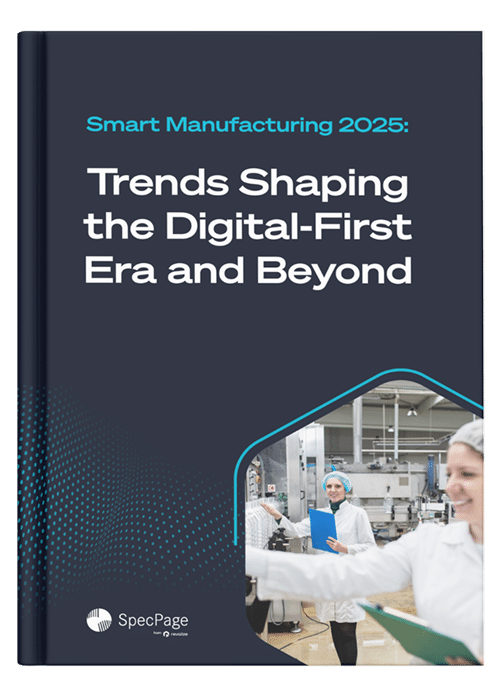PLM is product lifecycle management. SpecPage PLM provides a trustworthy and reliable foundation for digital transformation. PLM synchronizes data and streamlines production, saving time, avoiding confusion and accelerating speed to market.
Pre-research and development, when supplier costs and availability determine the profit margin for a product, PLM tracks the source of raw ingredients, processing date, expiration date and allergen information – all of the information necessary to make the best decisions for procurement, vendor selection and raw materials costs.
PLM is the most essential tool to achieve competitive advantages in the food and beverage industry:
Our suite of solutions includes on-premise and cloud-based out-of-the-box enhanced digital processes that were exclusively designed for formula-based production in the food and beverage industry.
We know what you do, we know how you do it and we can help you do it better – our process solution system requires 90 percent less effort to implement and configure. User training is simplified so you get to the results – and the ROI – faster than with any other process solution or PLM software.
We build the foundation for your success with product lifecycle management (PLM), product data management (PDM), laboratory information management systems (LIMS), Compliance, Supplier, Seller and Buyer’s guides as well as GDSN, SAP GTIN-Connector and EHSA – these products empower producers to digitize and leverage their data for a substantial return on investment.
The SpecPage suite of solutions combines digital tools to capture and manage the flow of data throughout the research and development, production and manufacturing cycle, creating visibility, transparency, traceability, and cohesive communications to facilitate essential collation and collaboration for the accumulative data.
The proven advantages to PLM include accelerated time to market, enhanced support for global regulatory compliance, increased revenue and substantial boosts to ROI, decreased production costs and improved product quality. PLM digital transformation supports traceability and regulatory compliance to secure food safety, benefiting individuals and organizations.
Food producers who have not optimized data or digitized their manufacturing processes must work with spreadsheets, and occasionally, single use products like ERP that address specific components, but do not provide comprehensive, end-to-end integration.
Human error, data entry error, lost, fragmented and untraceable documents cost time and money. Continually updating data across multiple BOM spreadsheets is not only time consuming, it causes issues in research and development, simulations and trials that are often unresolved until the end of the manufacturing process.
The essential value of PLM lies in innovative cross-functionality; PLM integrates, from product ideation, concept, trials, simulations, manufacturing, labeling, global regulatory compliance to the finished product. It creates and manages a continuous flow of ideas, and intellectual property which unites the necessary documents and data workflows for the entire supply chain management process.
Innovative product lifecycle management process solutions adapt perfectly with ERP systems. PLM manages the innovation of products, enriches the data in the ERP and adds functionality.
Most organizations purchase an ERP and try to expand functionality and functions – this sometimes works to a degree, but the process will never work as well as if the functionality had been built into the solution from the beginning. Even when 90 percent of the data is compatible, the ERP cannot support 10 percent variants, nutritional values, or product statuses.
Food and beverage manufacturers need a comprehensive process solution that has the flexibility and capability to integrate, end-to-end and provide the transparency that will allow them to optimize and employ their data as a valuable, strategic asset.
SpecPage offers unlimited, comprehensive implementation, training, and technical support from inception.
Prior to implementation, SpecPage process solution specialists determine individual goals and workflows to ensure maximum value in the shortest possible time period. We provide extensive training sessions for users and administrators as an integral part of successful product implementation. These training sessions and programs are conducted by experienced system trainers to empower your employees and rapidly increase productivity.
SpecPage University is our educational program, designed to transform organizations and deliver a wider impact by helping staff, personnel, and team members to develop the skills and knowledge to utilize all aspect of the SpecPage suite of solutions. This unique training university benefits and enriches the entire organization and stimulates company growth.
SpecPage University:
Our team of technical expert have decades of experience and they are available to help and answer your question via email, skype, phone, TeamViewer, or chat group so that you can get the information you need, fast.
Our Offices
50 N Laura St.
Suite 2500,
Jacksonville, FL 32202
United States
info@revalizesoftware.com
Harlow Enterprise Hub
Kao Hockham Building
Edinburgh Way
Harlow, Essex CM20 2NQ
United Kingdom
